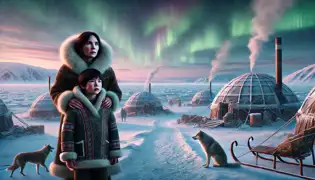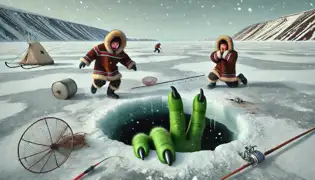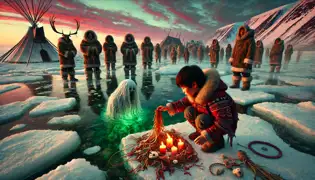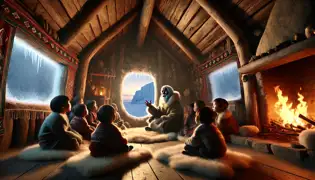Reading Time: 16 min

About Story: Kalopalik Story Alaska is a Folktale from united-states set in the Ancient. This Descriptive tale explores themes of Wisdom and is suitable for All Ages. It offers Cultural insights. A chilling tale from beneath Alaska's ice. .
In the frosty embrace of Alaska’s northern shorelines, where icy seas merge with rolling tundra, stories are as vital as the breath that crystallizes in the winter air. Among the tales shared around smoky fires, none carries such a bone-chilling thrill—yet also a strange, mesmerizing beauty—as that of Kalopalik, a mysterious creature said to dwell just beneath the ice. She is said to be ever-watchful, always waiting, and unafraid to pull the unwary down into her subzero realm.
For countless generations, the Inuit families along the frigid Alaskan coasts have recounted this legend to keep their children out of harm’s way. The ice, after all, can be both a friend and a deadly foe—solid in some parts yet perilously thin in others. Kalopalik, they say, specifically targets the disobedient: youngsters who wander too close to the water’s edge or show no respect for the natural balances that sustain life in this unforgiving land.
Kalopalik herself remains a puzzle. Part woman, part spirit of the sea, she wears a tattered, hooded cloak of seaweed and seal fur that clings wetly to her pale, almost translucent skin. Her wide, otherworldly eyes gleam like greenish orbs beneath the surface, and her long, bony fingers end in razors of keratin. She is rumored to clutch the underside of the ice, waiting patiently, listening for the carefree laughter of children who forget the warnings of their elders.
Raised amidst these warnings was a curious Inuit boy named Aklaq. His mother, Ataata, reminded him every morning, “Don’t follow the fox tracks too far, don’t stray toward the open sea, and if you ever hear a tapping beneath the ice, you run back home.” Aklaq would nod, big-eyed and solemn. Yet, like most children with boundless curiosity, the wide, glowing tundra beckoned him to explore.
On a crisp winter morning, Aklaq spotted an Arctic fox dashing across a bank of powdery snow. Eager to see where it might lead, he bounded off before he could think, chasing that white flash of fur. As he sprinted over a stretch of frozen shoreline, the ice beneath him felt suspiciously thin. Suddenly, he heard a low, melodic laugh. It echoed from somewhere deep below, reverberating in his ears like an echo from a dream. Heart pounding, he dropped to his belly, carefully peering through a transparent section of the ice.
Beneath the surface, the water was dark with swirling undercurrents. At first, he saw only shifting shadows, but then two faintly glowing eyes surfaced into view. In that instant, all the old warnings about Kalopalik felt paralyzingly real. Aklaq jerked back, scrambling to safer ground.
“Kalopalik…” The name stuck in his throat, barely audible above the wind. His breath caught in short bursts of cold air. Though his legs quivered, he forced himself to stand up. The fox he’d chased was nowhere to be seen. He realized how alone he was out there, so he hurried back to the village, fear trailing behind him like a shadow.
That night, he huddled close to the family’s radiant oil lamp, an old seal-oil lantern that cast flickers of dancing light upon the walls of their snug, round-shaped home. His grandmother, toothless but warm with affection, noticed his trembling hands. “Aklaq,” she said, voice low and soothing, “what’s gotten into you tonight?”
It took him a moment to find his voice. “I…I saw her today,” he finally blurted, eyes brimming with tears he refused to let fall. “Beneath the ice… Kalopalik.”
His grandmother nodded, as though this was the most ordinary news in the world. She turned to his mother, exchanging that familiar glance of concern grown-ups share when a child has learned a hard truth too soon. At length, she murmured, “She has seen you now, Aklaq. That means you must tread even more carefully.”
Time passed. Snowfall and sunshine waltzed in the winter sky, and the once-keen terror dimmed in Aklaq’s heart. Day after day, he played near the safety of the village, sometimes building snow houses with friends or helping with small chores like gathering driftwood. The memory of those eerie eyes began to feel distant, like a frigid dream. Yet the Arctic environment is relentless. It lulls the overconfident into a false sense of security, only to strike when caution is tossed aside.
On a brilliant, sunlit morning—one where the clouds seemed to have vanished overnight and the sky was a startling shade of blue—Aklaq and his friend Nukilik decided to go ice fishing. The day practically invited them: mild winds, a rosy glow on the horizon, and the promise of fish that might bite beneath the thick ice. They chose a spot the older hunters had deemed reliable, double-checking the thickness of the ice by tapping with their harpoons.

At first, everything felt normal, almost joyful. The boys laughed and joked, discussing the biggest fish they’d ever caught and the one time Nukilik’s father had brought home a massive seal. Then, the moment they dropped their lines in the water, Nukilik’s fishing pole jerked violently, so sudden that his arms almost got pulled down into the hole. “I’ve got something!” he cried, eyes alight with excitement.
Aklaq dashed over, gripping the pole with him. The force beneath the ice felt unnaturally strong—stronger than any fish either boy had ever encountered. They strained with all their might, expecting some giant cod or maybe even a small seal that had tangled in their line. But what emerged was far from any ordinary catch.
A dripping, gnarled hand shot up out of the hole, the fingers impossibly long, the nails jagged. The skin was the same pale-green hue Aklaq had glimpsed before—there was no mistaking Kalopalik now. Her palm slapped at the ice, searching for a hold, while her other hand tried to widen the opening. The boys could see a flash of her haunting eyes through the water.
In that moment, all composure deserted them. A scream tore from Nukilik’s throat as he let go of the pole and slid backward on the ice. Aklaq followed suit, and together they scrambled away, hearts pounding like drums. As they fled toward the village, they heard the ice crack under Kalopalik’s weight and the echo of her low, haunting laugh.

When they stumbled into the village, breathless and pale-faced, the elders quickly gathered. Stooped and grizzled men with sun-etched lines on their faces, women with wise eyes and firm stances, the village’s collective memory convened to hear the boys’ frantic story.
Aklaq, hands trembling, recounted every detail: the fishing hole, the violent tug, and the horrific hand that burst forth. Nukilik chimed in, tears threatening to fall, “She’s after Aklaq. I saw it in the way she looked at him.”
The oldest shaman, his dark hair braided with bits of bone and stone, spoke in hushed tones. “Kalopalik is no simple legend. She is ancient, as old as these waters. Those who disregard their elders’ caution awaken her attention. And once she sets her sights on you, she does not easily relent.”
Aklaq, voice trembling, asked, “What can I do?” His fear was raw, but beneath that fear was a spark of determination. He did not want his home to remain under the shadow of Kalopalik.
The shaman fixed him with a penetrating gaze. “You must appease her,” he said, nodding slowly. “It is time to remind her that we respect the sea. We must not attempt to claim what is not ours, nor venture into places our elders forbid.”
That night, the village prepared. The men carved new bone charms and women braided kelp cords with painstaking care. Children gathered seal oil while the elders chanted soft prayers, their voices blending with the wind that swept over the icy landscape. The air crackled with tension, each gust seeming to carry portents of what might happen by dawn.
The following morning, the horizon lit with bands of orange and gold, painting the ice in an otherworldly glow. Guided by the shaman, Aklaq led a small group of villagers to the fragile shoreline where the water remained partially open. In the distance, a jagged edge of sea ice extended into the Arctic Ocean. Aklaq’s heart hammered, but he held his head high, determined to meet Kalopalik on steadier ground.
Kneeling, he gently set the braided kelp rope, the bone charms, and small pouches of seal oil on the ice. “Kalopalik,” he whispered, voice trembling yet resolute. “We bring these gifts in respect. Forgive us if we have trespassed. We promise to honor your waters and live by the rules our ancestors taught us.”
For what felt like an eternity, the only sound was the wind whistling across the open expanse. Every villager present held their breath, the hush so complete that even the crunch of their boots on the ice felt thunderous. Then, a subtle quiver coursed through the surface. A faint crackling noise formed a circle of spiderweb cracks around the offerings. The water beneath turned murky, swirling in unpredictable patterns, until finally, a shape emerged, unsettlingly graceful yet threatening.
Kalopalik rose, her form half-submerged, the wet cloak of seaweed trailing behind her in lazy arcs. Those glowing eyes locked onto Aklaq. Some villagers gasped at her appearance, but they held their ground, determined to protect their young friend.

With a slow, deliberate motion, Kalopalik extended one of her hands. It hovered above the offerings as though she were deciding whether to accept them. At last, she clutched the bone charms and the kelp rope in her spindly fingers. The seal oil she allowed to seep through her hand into the water, as though anointing her realm. A ghostly smile tugged at the corners of her wide mouth.
“Remember this day,” her voice echoed in the still air, cold and clear as the ice itself. “Remember your promise. Should you ever forget, I will be waiting.”
With that, she slipped beneath the ice, leaving only faint ripples that gradually stilled. The villagers exhaled in unison, relief mixing with lingering awe and dread.
After that day, Aklaq was never quite the same. He still played and laughed with his peers, but there was a wisdom behind his eyes, a certain carefulness to each step he took on the frozen sea. He spent more time helping the elders, learning their ways, listening to the old stories and the ancient knowledge behind them. His respect for these traditions was no longer just about obeying rules—it became personal experience, etched into his spirit.
Seasons passed, and the cycle of snowmelt and freeze repeated year after year. Aklaq grew from a boy into a man, and then into a revered elder, carrying lines of wisdom on his own face. He watched younger generations scurry about with that same energetic spark he once held, and he took it upon himself to be their guide. In the evenings, when auroras danced across the sky like living curtains of color, he would gather children in a warm circle around a flickering lamp.
It was during these storytelling sessions that the legend of Kalopalik was kept alive. Aklaq would describe the ice, the cold, and the echoing laugh that spurred his nightmares for many nights. He talked about the fishing hole, the terror of seeing that hand rise from beneath the surface, and the precarious power humans hold when they forget the forces of nature lurking just beyond their sight.
Sometimes, a rambunctious child would roll their eyes, thinking it just another bedtime scare tactic. Yet Aklaq would meet those eyes with a gentle seriousness. “I know the difference between a story to frighten and a story to teach,” he would say softly. “Trust me, children: If you do not respect the ice, the ice will teach you respect in its own way. I’ve seen Kalopalik, looked into her eyes, felt her breath on my cheek. She is real.”
And if ever a curious youngster doubted him, Aklaq would take them on short, supervised walks near the shoreline. He’d point out the cracks in the ice, the different layers that formed and refroze, and show them how to test for thickness with a careful knock of a harpoon. Occasionally, the children would glimpse a fleeting shadow beneath the surface, or hear a low hum of something that didn’t sound entirely like wind. Their imaginations would swirl, and in that swirl they found caution.
Yet the story of Kalopalik was more than a warning: it was a reminder that life in these harsh landscapes demanded cooperation with nature, not dominance over it. The ocean gave them fish, seals, whales—but she could also swallow them whole. The sky provided breathtaking auroras and a compass for navigation, yet it could bring storms that blinded and battered the village. The land was abundant with wild game and berries in fleeting summers, yet it could become barren and deadly cold in winter.
No matter how wise or advanced the village became, Aklaq knew the old ways had to remain. The moment they believed themselves masters of nature, they’d slip into the same arrogance that once nearly cost him his life. Through that lens, Kalopalik was not merely a monster lurking in the depths; she was a living embodiment of nature’s wrath, a sentinel ensuring that the ungrateful or the careless met a swift, watery punishment.

On rare evenings, as the sun dipped low, Aklaq would stand by the edge of the sea ice and let the memory of that day wash over him. The shiver in his bones reminded him that he was lucky—lucky to have escaped Kalopalik’s clutches and lucky to have had the elders around to guide him. He’d think back on the offerings he placed on the ice, how the sea had calmed around him when Kalopalik accepted them, and how a part of him remained forever tied to that moment of confrontation and revelation.
Sometimes, his mind would drift back to that fleeting glimpse of Kalopalik’s face: the slick hair swirling under the water, the strangely mesmerizing glow of her skin, the expression that hovered between curiosity, hunger, and perhaps even a hint of sadness. He wondered if Kalopalik ever felt lonely in her subaquatic domain, if she roamed the under-ice waters in perpetual solitude. Of course, he would never dare ask her.
Children who heard Aklaq’s tale would grow up, passing on the same story to their own offspring. The cycle continued, weaving Kalopalik’s legend into the tapestry of village life. Each retelling was laced with cautious respect, urging new generations to be mindful of their footprints on the ice, of the gifts given by the ocean, and of the line where nature’s dominion must not be challenged.
Over the years, visitors from far-off places—researchers, explorers, the occasional adventurous traveler—would come, intrigued by the harsh beauty of the Arctic. They too heard whispers of the Kalopalik legend. Some scoffed, calling it myth, while others stood quietly enthralled by the sincerity with which the villagers spoke. A few travelers told stories of glimpsing an odd shape beneath the transparent ice, a flicker of pale-green in the corner of their vision. But so far, no one else had a story as vivid as Aklaq’s.
One autumn evening, just before the long polar night set in, Aklaq found himself restless. The sunset painted the sky in stripes of orange, purple, and pink. He felt an irresistible urge to walk out near the ice’s edge, as if drawn by some invisible thread. Wrapping himself in a heavy parka—adorned with careful stitching done by his late mother—he ventured forth.
Though old now, his step remained steady. He approached a spot that was part ice, part open water, and knelt down. Gliding his hand gently over the frozen surface, he closed his eyes and whispered a soft prayer of gratitude. The water, calm and dark, lapped subtly at the edges of the ice.
In that hush, he heard a faint, echoing laugh carry on the wind. It was neither threatening nor warm, but it held the same eerie resonance that had once frightened him as a boy. Slowly, he lifted his head, gazing through the ice. For a second, he thought he saw two luminous eyes far below, watching him, appraising him. A sense of calm acceptance coursed through him.
He didn’t speak, nor did he offer any new gifts. He simply placed a palm against the ice and, with all the respect he could muster, bowed his head. In return, the faint figure in the depths circled once, then faded into the dark waters. A swirl of bubbles marked her passing.
Aklaq lingered a while in the falling light, letting the cold wind bite at his cheeks. What he felt wasn’t fear but a profound reverence, an acknowledgment that some things in nature are bigger than human comprehension. Kalopalik, after all, was not just a monster to be loathed or appeased. She was part of this land’s delicate tapestry, one thread among many that bound past, present, and future together.
The old man rose, quietly retracing his steps to the village. The sky overhead was rapidly losing its color, and soon the stars would blaze in the Arctic night. But Aklaq’s heart felt warm—warm with the knowledge that he had carried forward the lessons of his elders, warm that he had passed them on to the young, and warm with the unspoken bond he shared with the creature beneath the ice.
He understood that Kalopalik’s story would outlive him, as it had outlived countless elders before. And so it should, because tales like this are part of how his people safeguarded their children from the merciless environment—and also how they remembered to live in harmony with it. So long as anyone stepped too close to the edge of the ice, heedless of warnings, Kalopalik would be there, a silent reminder that in this frozen world, respect is not optional.
And in that final understanding, Aklaq found a certain peace, content in the knowledge that when he was gone, the legend would stand guard, as unyielding as the ice itself.


















